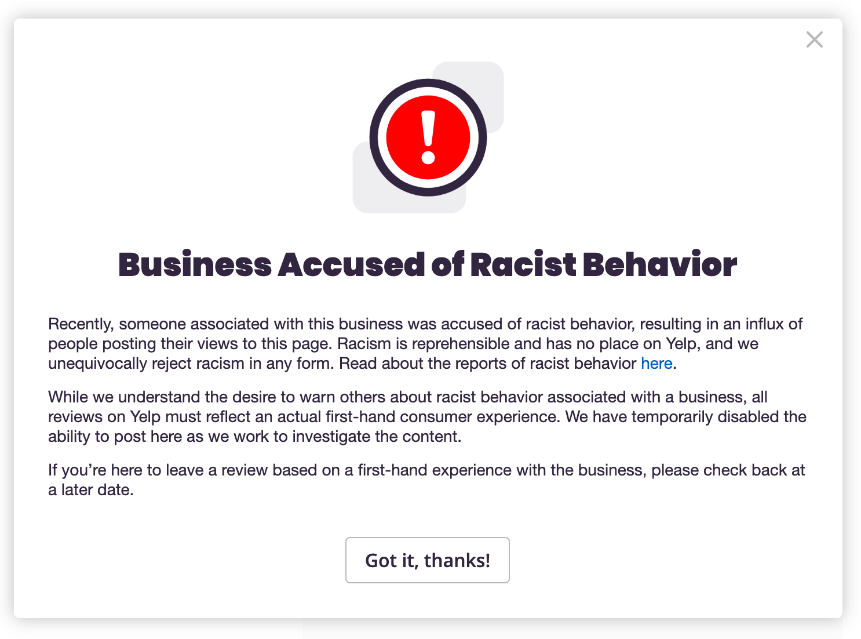
If you own a popular restaurant or small business, Yelp, the popular business-rating website, might just decide you’re a racist.
In a series of tweets and on its blog yesterday, Yelp announced it will label businesses with the woke version of the Scarlet Letter to help users avoid them.
What Yelp defines as “racist” is unclear. But this much is clear:
Yelp will soon become a means for competing businesses to attack one another, for angry customers to exact vengeance upon a business with which the customers are unhappy, and for aggrieved minorities to extract free goods and services with the threat of labeling a business racist.
The New Policy
If that sounds an awful lot like an extortion or blackmail racket, it should.
“Today, we’re announcing a new consumer alert to stand against racism,” Yelp courageously announced:
In the last few months, we’ve seen that there is a clear need to warn consumers about businesses associated with egregious, racially-charged actions to help people make more informed spending decisions.
“Communities,” Yelp averred, “have always turned” to the website for advice, and so the Anti-racism Gendarmes will be there to crack down on any business identified as “racist.”
Now, when a business gains attention for reports of racist conduct, Yelp will place a new Business Accused of Racist Behavior Alert on their Yelp page to inform users, along with a link to a news article where they can learn more.
Yet unclear is how Yelp will determine if a business is really “racist.” Perhaps an angry Black Lives Matter activist is simply trying to shake it down, or worse, destroy it, because an employee told him he can’t use the restroom if he isn’t a customer.
And the “racist behavior alert” is mighty unclear about something else: How Yelp will verify that the critic is reporting a first-hand experience.
“Recently, someone associated with this business was accused of racist behavior, resulting in an influx of people posting views to this page,” the alert begins.
With undaunted courage, the alert will continue:
Racism is reprehensible and has no place on Yelp, and we unequivocally reject racism in any form. Read about the reports of racist behavior here.
While we understand the desire to warn others about racist behavior associated with a business, all reviews on Yelp must reflect an actual first-hand consumer experience. We have temporarily disabled the ability to post here as we work to investigate the content.
If you’re here to leave a review based on a first-hand experience with the business, please check back at a later date.

And with that, an angry customer, helped by the “woke” leftists at Yelp, can destroy a man’s 40-year-old business.
Yelp claims its “top priority is to ensure the trust and safety of our users and provide them with reliable content to inform their spending decisions, including decisions about whether they’ll be welcome and safe at a particular business.”
Where an accused business’s reputation fits in, we are not given to know. The announcement does not explain what a business can do if “someone” falsely accuses it of “racism.”
And data on such reports so far don’t offer much hope that Yelp will investigate anything:
Between May 26 and September 30, we placed more than 450 alerts on business pages that were either accused of, or the target of, racist behavior related to the Black Lives Matter movement. We have maintained around-the-clock support over the last few months to ensure that we’re maintaining the trust and safety of our users and business owners.
Lawsuits Coming?
The problem for a business that Yelp and its users target and destroy is Section 230 of the Communications Decency Act, which protects Yelp and other social-media sites from defamation claims.
In 2018, the California Supreme Court ruled that a plaintiff could not force Yelp to remove a defamatory claim. The U.S. Supreme Court refused to hear an appeal.
Then again, a good plaintiff’s attorney might argue the “racist alert” opened Yelp to defamation or other claims, such as false light or tortious interference, because the website, not users, applied and published the defamatory label.




